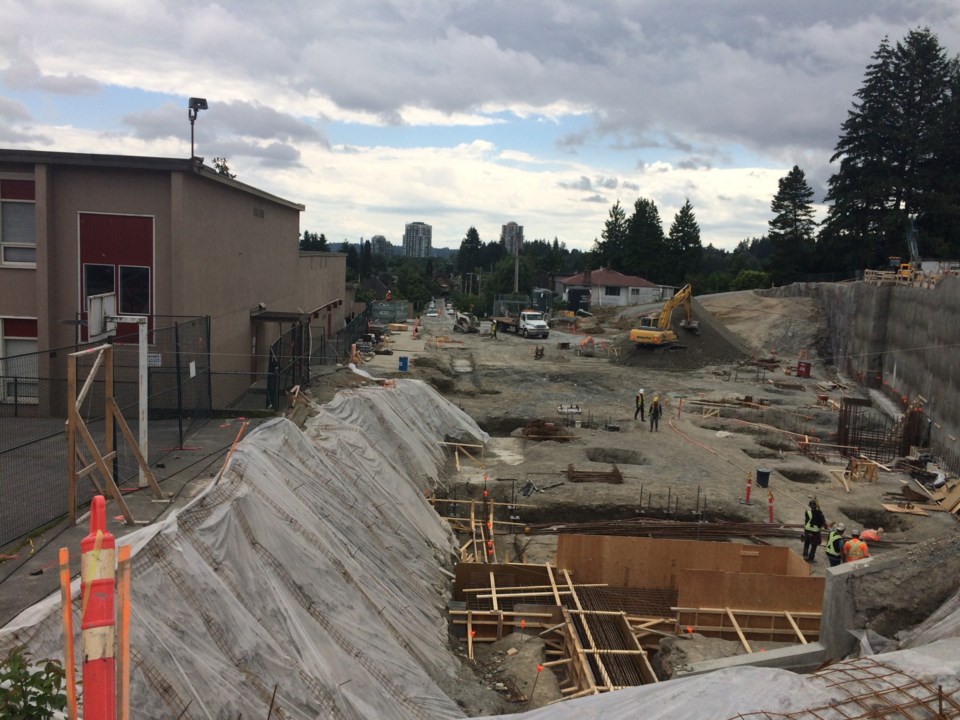For more than 90 years, Richard McBride Elementary School has stood on the hillside, looking out over Sapperton and the Fraser River beyond.
But the view is soon to change, as the historic structure with its turreted façade is set to come down to make way for a new school building. With that move may come what, for many, will be an even bigger change: a new school name.
The New Westminster school district has agreed to launch a renaming process for the school after a request from McBride’s parent advisory council (PAC).
The issue? The views – and actions – of the man for whom the school was named. McBride was the 16th premier of British Columbia, from 1903 to 1915. He held publicly expressed views against Asian and Indigenous people and against women’s suffrage, and throughout his time in office he oversaw legislation reflecting those views. (See sidebar at end.)
All things considered, PAC president Jen Knight noted, that legacy doesn’t represent what the McBride school community wants to be.

“The timing is really ideal now; with the building of our new school, it’s a fresh start,” she pointed out, adding the move also makes sense against the broader global picture. “With recent world events, people are really looking for ways to celebrate diversity and inclusivity.”
With the New Westminster school board having recently pledged its commitment to undertaking anti-racism work in the district, the timing made sense.
The idea came to the PAC from its secretary, Cheryl Sluis, and was discussed at the group’s annual general meeting in June (held virtually due to COVID-19).
Sluis explains she had a friend whose child was asked to do some research into the school’s namesake, and it was easy to find examples of McBride’s racist and sexist views. Sluis herself delved into McBride’s past before she came to the PAC with her suggestion and says she was surprised by how easy it was to uncover those views.
“I, to be honest, had no idea who he was,” said Sluis, who moved to New West from the Prairies four years ago. “It really didn’t take long at all to figure out how this was probably not a person we wanted to celebrate.”
For Sluis, the school name is important for the message it sends to the community.
“I guess I was most concerned with the children who attend the school and the message that we’re sending to them by celebrating a person who held these racist and discriminatory views, which ended up in racist and discriminatory policies and legislation,” she said. “I think about what they might make of having his name on their place of learning, and what about if that student was racialized? … We know that New West is a very diverse city, and I think it’s really important that we have our children identify positively with the name of their school. We want it to resonate with kids, and we want it to reflect values of equity and inclusion.”
Sluis knows the renaming proposal is not without its critics.
“I am aware of lots of positive feedback. I’m also aware that there are some people who think this is yet again another way of erasing history, or something like that, and tradition. There are a lot of people in New West who feel it’s really important to honour the traditions of New West,” she said.
While Sluis understands that, she also notes there’s a good chance for discussion about the issue now.
The renaming process is now out of the PAC’s hands; the school district now embarks on the process laid out in its administrative procedures.
In a June 24 letter, school district superintendent Karim Hachlaf told the McBride PAC that an update will come back to the school board at its first operations committee of the fall, tentatively scheduled for Sept. 22.
The district’s procedure calls for the committee to include a wide range of staff and community representatives – including a trustee, administrative staff, union representatives from both CUPE and the New West Teachers’ Union, community members, student advisory members, a PAC rep and more.
Once the list of participants has been finalized, the committee will meet to recommend a plan and consultation timeline to the board. After it carries out its consultation process, the committee will present a summary report and recommendation to the board, and the school board will make the ultimate decision about a new school name.
“One of the reasons I think the timing right now is right – we’ve got 18 months or so before this new school is going to be built,” Sluis pointed out. “There’s a lot of opportunity for dialogue and for educating.”
She’s hopeful that by holding an open community process about the renaming, those who object to “erasing” the name will realize why the PAC is pushing for change.
“I’m confident that if we are able to have the dialogue and explain why we think this is important, that people will come around,” she said. “I’m hopeful that people will come around.”
WHAT IS IT ABOUT RICHARD McBRIDE?
In a June 22 letter to the New Westminster school district, the Richard McBride PAC executive outlined some of their findings about the school’s namesake.
Among those findings:
During his time as premier (1903 to 1915), McBride advocated for “a white B.C.” and sought to shut out the “Asiatic hordes.” He worked hard to prevent “cheap” Japanese labour from competing in the fisheries and in “everything the white man has been used to call his own.”
McBride led the legislature in passing numerous anti-Asian measures, such as taxes on companies that hired Chinese labourers and legislation denying the vote to Asians and Indigenous people.
After the Conservatives formed the federal government in 1911, McBride urged Prime Minister Robert Borden to honour a promise to legislate against immigration from Asia.
McBride was premier at the time of the Komagata Maru incident, when the Japanese steamship carrying hundreds of Sikh passengers was prevented from docking and most of its passengers were barred from entering B.C. McBride was quoted as saying: “To admit Orientals in large numbers would mean the end, the extinction of the white people.”
As premier, McBride pursued a policy of making way for economic development and the expansion of cities by dispossessing Indigenous nations of their reserve lands.
McBride was also well-known as a leading anti-suffrage politician at a time when white women were gaining the vote across Canada. He believed extending the franchise to women would take away too much power from men.
- Source: Cheryl Sluis, PAC letter to New Westminster school district



